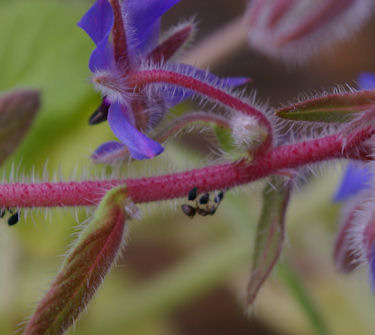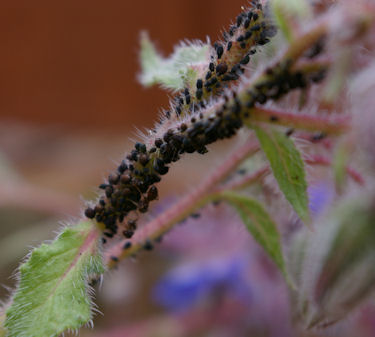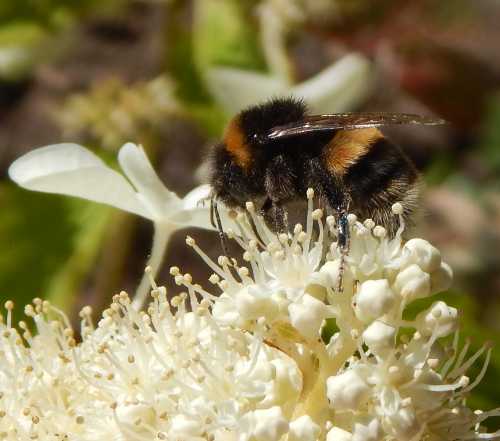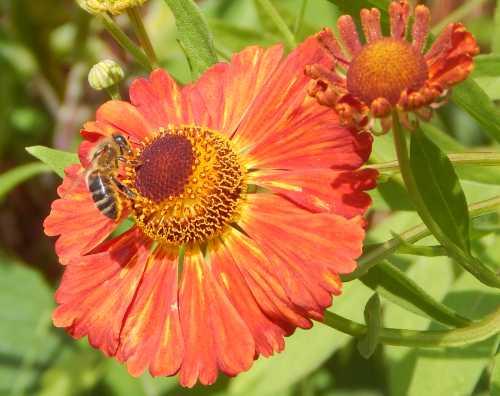Will Bees Protect My
Tri-color Birch From Aphids?
I had a query from a gentleman asking whether bees would protect his tri-color birch from aphids, or whether it would be safe to use an insecticide to get rid of the aphids without harming the bees.
I hope the gentleman concerned sees this post - I tried to respond, but the email came back 'undeliverable'.
Still, I publish my answer here, in case it helps others.
Bees won't protect plants from aphids
Indeed,
it's fairly common that bees are seen feeding on what is known as 'honeydew' - which is a type of sweet excretion produced by aphids and scale insects that feed on plant sap.
 Above: I planted borage for the bees. Aphids like borage too, apparently. This in turn attracted ants to the aphids.
Above: I planted borage for the bees. Aphids like borage too, apparently. This in turn attracted ants to the aphids.Ants also like honeydew, and even 'protect' aphids in a form of symbiotic relationship that benefits ant and aphid - sometimes referred to as 'farming'!
 Look closely and you can see at least one ant with this group of aphids.
Look closely and you can see at least one ant with this group of aphids.However, in the case described by the gentleman, I'm afraid the bees are neither eating nor killing off the aphids, so the presence of the bees will not protect the tree from aphid attack.
However, using an insecticide is likely to kill/harm the bees
Insecticides act on insects, and that includes beneficial ones, so spraying or treating with a toxin is a bad idea.
What about systemic insecticides?
This is a bad idea too! Systemic insecticides (like neonicotinoids) basically create a toxic plant. Indeed, systemic insecticides are designed to ensure sap sucking insects are poisoned by the chemical.
Research suggests that flowers produced by a neonicotinoid treated tree or plant, will in turn present that poison to pollinators or other beneficial insects in their nectar (Bonmatin et al 2004 is one example). Systemic insecticides may also be persistent in soil, and leach to other areas, thus contaminating other plants.
Presumably, aphids that ingested the sap will then be toxic for other creatures (beneficial predators) that might feed on them.
It's possible to get rid of aphids without using poisons
I
had aphids on my plums several years running (though no bees feeding on the aphid honeydew).
The plum tree recovered each time, and I was relieved because the plums are excellent.
In the case of aphid infestation, I think it would be a good idea to act quickly. This is what I did:
- I removed the leaves that were especially shriveled and infested (mostly the new growth) and the very ends of the twigs.
- I then blasted the leaves with water (using the hose) each day for about a week, then kept an eye on things. I know some people use soapy water - just ordinary very diluted, household liquid soapy water, sprayed on to the leaves.
I have had no aphid problems this year.
Some people also advocate growing onions and alliums nearby (and I have heard of garlic spray being used, but have no experience of this for aphid control, though I have used it to deter slugs from my lupines).
If you are concerned about aphids, you could also invest in lacewing and ladybeetle larvae to protect your plants from aphids ahead of aphid season.
If you found this page helpful or interesting, I'd really be grateful if you would share it with others - if not this page, perhaps another, such as Gardening For Bees.
Thank you so much :) .

